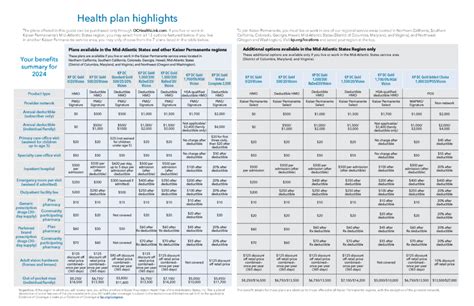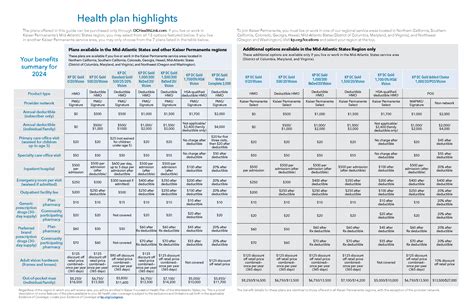Intro
Kaiser Permanente is a well-established and reputable health insurance provider in the United States, offering a wide range of plans to individuals, families, and businesses. With a strong focus on preventive care and comprehensive coverage, Kaiser Permanente has become a popular choice for those seeking quality and affordable healthcare.
For many, navigating the complex world of health insurance can be overwhelming. With numerous options available, it's essential to understand the benefits and features of each plan to make an informed decision. Kaiser Permanente's diverse portfolio of plans caters to various needs and budgets, ensuring that individuals and families can access the care they require.

Types of Kaiser Permanente Health Insurance Plans
Kaiser Permanente offers a variety of plans, each designed to provide comprehensive coverage and flexibility. Some of the most popular plans include:
- HMO (Health Maintenance Organization) Plans: These plans require members to choose a primary care physician (PCP) who coordinates their care and refers them to specialists within the Kaiser Permanente network.
- POS (Point of Service) Plans: These plans offer more flexibility, allowing members to see any healthcare provider, both within and outside the Kaiser Permanente network.
- PPO (Preferred Provider Organization) Plans: These plans provide a network of preferred providers, but members can also see out-of-network providers at a higher cost.
- EPO (Exclusive Provider Organization) Plans: These plans require members to see healthcare providers within the Kaiser Permanente network, except in emergency situations.
Key Benefits of Kaiser Permanente Health Insurance Plans
Kaiser Permanente's plans offer numerous benefits, including:
- Preventive care: Many preventive services, such as routine check-ups, vaccinations, and screenings, are covered at no additional cost.
- Comprehensive coverage: Plans cover essential health benefits, including hospital stays, surgical services, and prescription medications.
- Network of providers: Kaiser Permanente has a large network of healthcare providers, including primary care physicians, specialists, and hospitals.
- Convenience: Members can manage their care online, including scheduling appointments, refilling prescriptions, and accessing medical records.
Kaiser Permanente Medicare Advantage Plans
Kaiser Permanente also offers Medicare Advantage plans, designed for individuals 65 and older or those with disabilities. These plans combine Medicare Parts A and B coverage with additional benefits, such as:
- Prescription medication coverage: Many plans include Part D prescription medication coverage, with no additional premium.
- Vision, dental, and hearing coverage: Some plans offer additional coverage for vision, dental, and hearing services.
- Fitness programs: Many plans include fitness programs, such as gym memberships or fitness classes.

How to Choose the Right Kaiser Permanente Plan
With numerous plans available, selecting the right one can be challenging. Consider the following factors when choosing a Kaiser Permanente plan:
- Network: Ensure the plan's network includes your preferred healthcare providers.
- Coverage: Review the plan's coverage, including essential health benefits and any additional benefits.
- Cost: Compare plan premiums, deductibles, and copays to ensure the plan fits your budget.
- Convenience: Consider the plan's convenience features, such as online appointment scheduling and prescription refills.
Kaiser Permanente Health Insurance Plans for Businesses
Kaiser Permanente also offers health insurance plans for businesses, designed to provide comprehensive coverage for employees. These plans can help businesses:
- Attract and retain top talent: Offering comprehensive health insurance can be a valuable benefit for employees.
- Improve employee health and productivity: Kaiser Permanente's focus on preventive care can help reduce absenteeism and improve employee productivity.
- Manage healthcare costs: Kaiser Permanente's plans can help businesses control healthcare costs through negotiated rates and efficient care coordination.

Why Choose Kaiser Permanente for Business Health Insurance
Kaiser Permanente's business plans offer numerous benefits, including:
- Comprehensive coverage: Plans cover essential health benefits, including hospital stays, surgical services, and prescription medications.
- Network of providers: Kaiser Permanente has a large network of healthcare providers, including primary care physicians, specialists, and hospitals.
- Convenience: Members can manage their care online, including scheduling appointments, refilling prescriptions, and accessing medical records.
- Cost savings: Kaiser Permanente's plans can help businesses control healthcare costs through negotiated rates and efficient care coordination.
Conclusion
Kaiser Permanente health insurance plans offer comprehensive coverage, flexibility, and convenience. With a wide range of plans available, individuals, families, and businesses can find a plan that meets their unique needs and budget. By understanding the benefits and features of each plan, individuals can make informed decisions about their healthcare and ensure they receive the care they require.
What is the difference between an HMO and a PPO plan?
+An HMO plan requires members to choose a primary care physician who coordinates their care and refers them to specialists within the network. A PPO plan, on the other hand, provides a network of preferred providers, but members can also see out-of-network providers at a higher cost.
Do Kaiser Permanente plans cover preventive care?
+Yes, Kaiser Permanente plans cover many preventive services, including routine check-ups, vaccinations, and screenings, at no additional cost.
Can I see any healthcare provider with a Kaiser Permanente plan?
+It depends on the plan. Some plans, such as HMO plans, require members to see healthcare providers within the Kaiser Permanente network, except in emergency situations. Other plans, such as PPO plans, allow members to see out-of-network providers at a higher cost.
